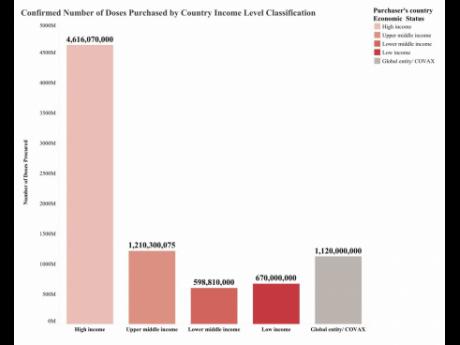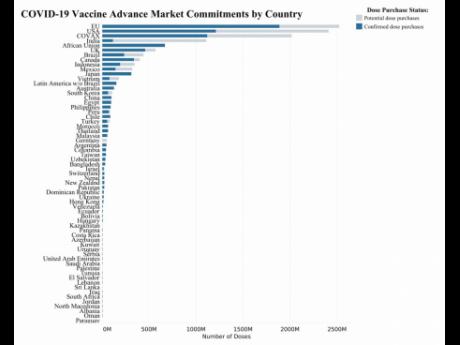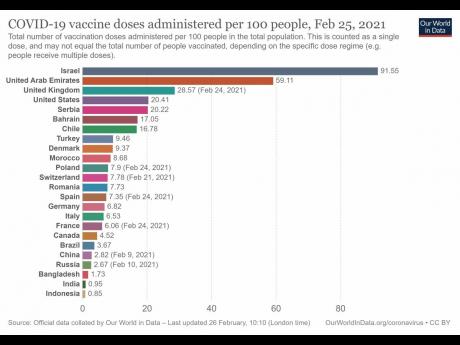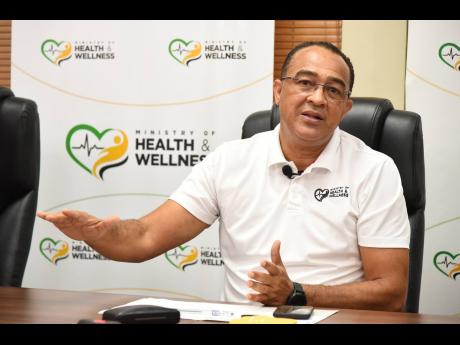Christopher Tufton | Setting records straight on COVID-19 vaccine
That a COVID-19 vaccine is the light at the end of the pandemic’s tunnel is a truth universally acknowledged, from the very outset of the COVID-19 pandemic. Wealthy countries’ governments supported and subsidised the accelerated development of a vaccine, and less wealthy countries, like Jamaica, put their lot in with the COVAX consortium, by contributing an affordable amount of money to a common fund that would also be put towards vaccine development, and would guarantee some vaccines once it was approved.
Jamaica’s participation in COVAX was not only meant to secure access to vaccines, but to secure access to World Health Organization (WHO)-approved vaccines. From the outset, Jamaica has followed world standards in the management of the pandemic: our testing protocol was based on the WHO recommendations, our discharge criteria were informed by WHO research and analysis, and our treatment protocols have followed the WHO’s evidence-informed guidelines. We trust the WHO’s expert panels, including the Strategic Advisory Group of Experts on Immunization.
While many people accept that a vaccine is essential to stopping the spread of COVID-19, not everyone intends to take it. In Jamaica, low take-up of the COVID-19 vaccine would forestall us getting to herd immunity, and the virus would continue to spread, causing illness, hospitalisation, and death. We have reason to be concerned about low take-up as the anti-vaxxer movement has grown and strengthened over the past few years. We have seen this manifest in Jamaica already with the HPV vaccine, where the take-up was less than 40 per cent, despite the vaccine being promoted by all the medical groups in the country, provided free of charge, and protecting girls from a deadly cancer.
Further, the conspiracy theories surrounding COVID-19 include those about the vaccine, and many Jamaicans, including front-line healthcare workers, have implicitly or explicitly stated that they will not be taking it.
Not every vaccine is certain to work. Australia had reserved 51 million doses of a home-grown vaccine that failed in clinical trials. Sanofi and GlaxoSmithKline Plc had to delay their clinical trials after setbacks. Merck shut down its vaccine programme three weeks ago after lacklustre early results.
Given these pre-existing factors, Jamaica took the decision that it would only administer vaccines that had passed the strictest international standards. The risk of bringing in a vaccine about which there could be any doubt is too great. Besides compromising this COVID-19 vaccine effort, it could damage Jamaica’s vaccine programme for generations to come.
Why have other countries received the vaccine before JAMAICA?
There are three reasons. First, rich countries have accumulated extensive supply deals. The United States struck unilateral deals for all of its 1.2 billion dose supply, four times more doses than its population. Wealth has moved some countries to the front of the line. Other countries may have to wait until 2022 or later before supplies are widely available. Some of these countries have higher rates of COVID-19 mortality and have signalled that they intend to eventually share these enormous supplies.
Second, this hoarding by rich countries has slowed the COVAX facility’s obtaining what had been allocated to them. Third, other countries are not following as stringent standards as we are in Jamaica, and are administering vaccines that are not WHO-approved, or not yet WHO-approved.
Barbados, Dominica and the Dominican Republic received supplies of the Oxford-AstraZeneca produced by the Serum Institute of India through a donation from India, amounting to 100,000, 70,000 and 30,000, respectively. India should be commended for this donation to our Caribbean neighbours. Through this supply, Barbados has vaccinated about 14,000 persons. Some countries, including Guyana and Trinidad and Tobago, have received a small supply as gifts from Barbados. Dominica also made donations to some of the smaller Caribbean islands, including St Lucia, Antigua and Barbuda, St Vincent and the Grenadines, St Kitts and Nevis, and Grenada. St Vincent and the Grenadines also received 20 doses of the Russian Sputnik vaccine, an intermediary dose. This vaccine has not been approved for emergency use by the WHO. Britain and the Netherlands have also supplied their overseas territories in the Caribbean with approved vaccines, including Pfizer and Oxford AstraZeneca.
All Caribbean countries have signed up under COVAX and like Jamaica are seeking to secure supplies from other countries, including China, India, Cuba and Russia through bilateral negotiations.
Jamaica should receive its first supply of vaccines through COVAX by the end of February. A budget of J$5 billion was approved that will allow us to purchase more than three million vaccines. In sum, we will receive vaccines from five sources: COVAX (AstraZeneca, SK), AMSP (AstraZeneca & Johnson and Johnson), India (SI), Moderna (Moderna), and the Jamaican private sector (AstraZeneca, SI)
Vaccine challenges not unique to Jamaica
What we are witnessing across the world is ‘vaccine nationalism’ instead of vaccine equity. Some countries have cornered the supply so much that they can offer up to four doses per person, while many developing countries are yet to receive a single dose of vaccines. Even where supplies had been secured, several Latin American, Caribbean, and African states do not have enough for the majority of the population. Statistics from Duke Global Health Innovation Centre show that total worldwide confirmed purchases are concentrated in high income (4.6 billion doses) and middle-income countries (1.2 billion doses). This is also true for vaccine administration so far.
What GOJ is doing in the interim
Preparations are being made to ensure that there are no major challenges when the vaccines arrive in Jamaica. Storage and other facilities have been put in place and nurses, who will carry out the inoculation, have been trained.
Despite the human-resource challenges that we face, while we await the vaccines, we are meeting the current challenge by recruiting new staff across the different regions. At the same time, we continue to lose our nurses to richer countries, such as the United Kingdom which has deployed a fast-track (within three weeks) visa recruitment strategy to attract them during the COVID pandemic. Our own recruitment strategy to fill current gaps is therefore extremely important.
The ministry is also accelerating the expansion of numbers of COVID-19 hospital beds across the island. Field hospitals are being built at Falmouth Public General Hospital in Trelawny, at St Joseph’s Hospital & Medical Centre in Kingston, and at the Mandeville Regional Hospital in Manchester. The 40-bed field hospital that was originally sited at the National Chest Hospital will be moved to Spanish Town.
We are expanding our staff capacity to respond to increases in hospitalisations and the resulting pressure on the healthcare system. We continue to focus on testing. Private labs across the island are now certified to conduct COVID-19 tests, and systematic testing throughout the island’s hospitals and health centres is ongoing. A nationwide communication campaign is in the works. This is necessary to ensure that every Jamaican understands and appreciates the nature and severity of the problem, the importance and safety of the vaccine, the solutions to the challenges we face, and their role in the process. The campaign will help to bridge the gap between policy and implementation and between the Government’s action and that of our citizens.
The Government cannot meet the challenges alone. Citizens must play their part, too. Without compliance with DRMA regulations, we risk undermining the efforts of the Government. These regulations will not be effective if people do not comply.
We must continue, as a country, to make every effort to reduce the spread of COVID-19 and bring the pandemic under control. The Government continues to develop and implement the necessary policies and strategies, but the public must play its part by observing protocols and regulations, wearing a mask, sanitising regularly, avoiding crowds and gatherings, and staying six feet apart from other people. The only way out of this pandemic is for all of the country to be a part of the effort.
- Dr Christopher Tufton is Jamaica’s minister of health and wellness and member of parliament for St Catherine West Central. Send feedback to cctufton@gmail.com or columns@gleanerjm.com.




